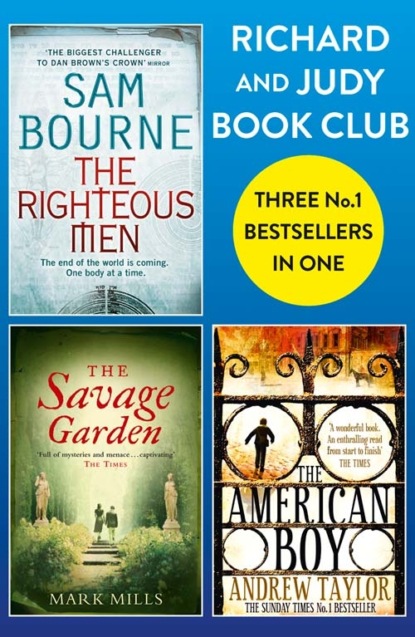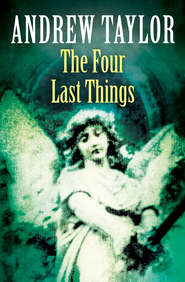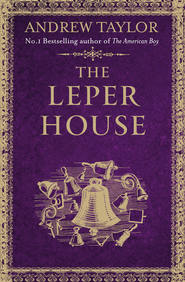По всем вопросам обращайтесь на: info@litportal.ru
(©) 2003-2024.
✖
Richard and Judy Bookclub - 3 Bestsellers in 1: The American Boy, The Savage Garden, The Righteous Men
Автор
Год написания книги
2018
Настройки чтения
Размер шрифта
Высота строк
Поля
Not just one man but two: the second flung himself at me. Both wore dark clothes. I twisted in the grasp of the first. Metal chinked on the brickwork. I smelled hot, stale breath. A voice swore. I heard footsteps running through the muck from the street.
“God damn you,” a man howled.
A great blow hit my head. Pain fogged my vision. The last thing I heard was another man yelling: “Mother of Christ! Get the God-damned blackbird!”
Chapter 27 (#ulink_b67c6dc7-bce4-52a4-bd47-7f106663598a)
I retain little memory of what happened next. I lost all awareness of my surroundings for several seconds, perhaps longer. Nor, when I regained it, was I much the better for the achievement. It was only with an immense effort of the intellect that I was able to determine that the fog was as heavy as ever, and that for some reason someone was half carrying, half dragging me through a crowd of jostling people.
I gasped for air. A man shouted something very near to my ear, and a moment later I found myself being bundled into a hackney. I collapsed on to the seat.
“Brewer-street,” said a man beside me.
“He’s foxed,” said a second voice.
“No. He’s fainted. Nothing more.”
“If he flashes the hash in there –”
I heard the chink of coin, and the voices fell silent. A moment later the hackney began to move. Our progress was slow. I huddled in the corner with my head in my hands. The swaying of the carriage made me feel nauseous, and for a while I thought the coachman’s fears would be justified. Time ceased to mean anything. The light hurt my eyes. My companion did not attempt to speak to me. I doubt if I could have answered him if he had.
The hackney pursued a zigzag course and in time its swaying became familiar, almost a source of comfort rather than of unease. I opened my eyes and squinted outside. There, looming out of the fog, was the unmistakable shape of St Ann’s Church with its slatted belfry and swollen spire. The recognition gave my mind a jolt which seemed to free some internal mechanism: the cerebral processes began to flow smoothly once more.
What the devil was I doing in a hackney? Had I been kidnapped? Try as I might, I could remember nothing between being thrust into the carriage and, at some undefined point earlier, Iversen the shopkeeper watching me as I went through the contents of Mr Poe’s valise. Slowly I turned my head, and the movement made the ache worse.
“Ah,” Salutation Harmwell said. “The colour has returned to your face, Mr Shield. That is a good sign.”
“Mr – Mr Harmwell. I don’t understand.”
“You remember nothing?”
“No – there seems a gap in my memory.” Even as I was speaking, that mysterious void disgorged a fragment of information. “The blackbird.”
“I beg your pardon?”
“I remember someone – damned if I know who, or when, or why – an Irish voice, I think – someone saying something about a blackbird. And in St Giles, as I recall, the word is commonly used –”
“To describe a man of colour?”
“Precisely. Pray, Mr Harmwell, can you enlighten me as to how I come to be here?”
“I chanced to be walking down Queen-street when I heard the sound of an affray. I looked into the passage of the shop I was passing and saw you engaged in a struggle with two desperate ruffians. Not that I recognised you at this point – all I knew was that some poor innocent was in the process of being beaten and robbed. So I knocked one of them down. The other ran off and I judged it prudent that we should withdraw as soon as possible.”
I glanced down at his hand and saw that his knuckles were badly grazed. “I am much obliged to you, sir.” I rubbed the side of my head where a bruise was already forming. “I – I do not know what I would have done if you had not happened to be passing.”
“You have lost your hat, I am afraid. Indeed, I think it must have taken the full force of the blow, and you would have been in a much worse state if it had not been there. I believe you had a stick, too, but that has gone as well.”
I nodded. I had not noticed the absence of either. I bit back the observation that it was surely a remarkable coincidence that Harmwell should have happened to be passing. The fact that the coincidence had been of great service to me was neither here nor there.
“Do you still have your purse?”
I felt in my pocket. “Yes.”
“That is something.”
I knew only that I must be cautious, not why. I said slowly, “Perhaps I was passing along the street, and they dragged me into the passage in order to rob me.”
“That is unlikely,” Harmwell replied. “I think I should have seen you, despite the fog. It is more probable that you entered the passage from the other side, or possibly from a side door of one of the houses it serves.”
The hackney moved steadily westwards, wriggling through the bustling streets into the heart of Soho. At last we reached Brewer-street. Harmwell directed the coachman to a house on the north side, near the corner with Great Pultney-street. He waved aside my attempt to pay the fare.
The dizziness returned when I stood up. Harmwell helped me down and lent me the support of his arm as we went into the house. A servant with a blank face and shabby livery conducted us upstairs. It appeared that Mr Noak had taken the whole of the first floor. There was a sitting room at the front, and Harmwell settled me on a sofa beside the fire and told the servant to bring me a glass of brandy. He went in search of his master. By the time he returned with Mr Noak, I had swallowed half the brandy and regained a few more of my wits. But I still could not remember what had happened in the interval of time between my being in Mr Poe’s room in Queen-street and Harmwell bustling me into the hackney.
God-damned blackbird?
As I heard that coarse voice in my mind, an image from those lost moments of my life slipped into the forefront of my memory: that of a small, childlike creature seizing my hand and kissing it. The memory was so clear that I saw the grey lice moving in her sparse ginger hair.
I rose to my feet as Mr Noak entered and found I could stand without support. He gave me his hand and asked me how I did. I stumbled out my thanks to Harmwell for saving my life, and to Mr Noak himself for his hospitality.
“Harmwell did no more than his plain duty as a Christian,” Noak said in his hard New England voice. “It was providential he should have been passing.”
“Indeed,” I said.
“Pray be seated.” Noak settled himself in an armchair on the other side of the fire. “The last time we met, Mr Shield, we disputed about the value of reading Ovid. I do not know London well but I understand from my clerk that he came across you in a part of town which is not the usual haunt of schoolmasters.”
“Mr Carswall sent me there upon an errand.”
“Mr Carswall? Yes, I had the pleasure of seeing him recently, though on a melancholy occasion.” He looked sharply at me. “Forgive my curiosity, but I thought you were employed at a school outside London.”
“I am, sir, but at the present I am staying with Mr Carswall in Margaret-street so that I may give lessons to Charles Frant.”
Noak’s mouth tightened. “We must applaud Mr Carswall’s charity in providing a home for Mrs Frant and her fatherless boy.”
He paused, seeming plunged in gloomy reflection. Time passed. My own thoughts were scarcely happy either. Mrs Frant might not have needed Mr Carswall’s charity if I had not witnessed George Wavenhoe’s signature on his deathbed.
At length he continued: “Are you able to remember who attacked you? No doubt you will wish to lay information against them in Bow-street.”
“I regret that I cannot remember the circumstances of the attack, nor of Mr Harmwell’s rescue.”
“How very unfortunate. Still, you know where it happened, and Harmwell saw your assailants.”
Harmwell coughed. “The passage was gloomy, sir. I did not have a clear view of them.”
“And St Giles is a lawless place,” I pointed out. “The men who attacked me will no longer be there.”
Noak glanced from Harmwell to myself. “What about the people of the house? Were they concerned in the attack?”
Harmwell shrugged.











